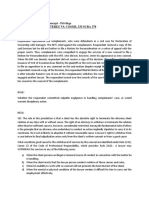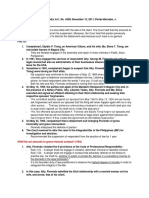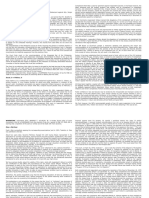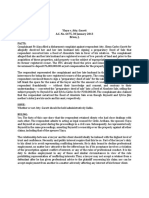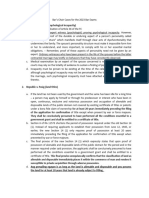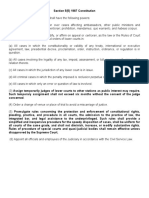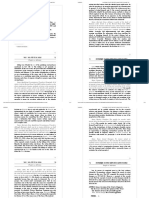0 ratings0% found this document useful (0 votes)
320 viewsSoriano Vs Dizon
Soriano Vs Dizon
Uploaded by
Carlos JamesThe document discusses a case involving a lawyer who shot a taxi driver following a traffic incident. The court held that the lawyer's crime of frustrated homicide involved moral turpitude and that his conviction warranted disbarment. Aggravating factors noted by the court included that the lawyer was the aggressor and acted with treachery in unexpectedly shooting the unarmed victim.
Copyright:
© All Rights Reserved
Available Formats
Download as DOCX, PDF, TXT or read online from Scribd
Soriano Vs Dizon
Soriano Vs Dizon
Uploaded by
Carlos James0 ratings0% found this document useful (0 votes)
320 views2 pagesThe document discusses a case involving a lawyer who shot a taxi driver following a traffic incident. The court held that the lawyer's crime of frustrated homicide involved moral turpitude and that his conviction warranted disbarment. Aggravating factors noted by the court included that the lawyer was the aggressor and acted with treachery in unexpectedly shooting the unarmed victim.
Original Title
Soriano vs Dizon
Copyright
© © All Rights Reserved
Available Formats
DOCX, PDF, TXT or read online from Scribd
Share this document
Did you find this document useful?
Is this content inappropriate?
The document discusses a case involving a lawyer who shot a taxi driver following a traffic incident. The court held that the lawyer's crime of frustrated homicide involved moral turpitude and that his conviction warranted disbarment. Aggravating factors noted by the court included that the lawyer was the aggressor and acted with treachery in unexpectedly shooting the unarmed victim.
Copyright:
© All Rights Reserved
Available Formats
Download as DOCX, PDF, TXT or read online from Scribd
Download as docx, pdf, or txt
0 ratings0% found this document useful (0 votes)
320 views2 pagesSoriano Vs Dizon
Soriano Vs Dizon
Uploaded by
Carlos JamesThe document discusses a case involving a lawyer who shot a taxi driver following a traffic incident. The court held that the lawyer's crime of frustrated homicide involved moral turpitude and that his conviction warranted disbarment. Aggravating factors noted by the court included that the lawyer was the aggressor and acted with treachery in unexpectedly shooting the unarmed victim.
Copyright:
© All Rights Reserved
Available Formats
Download as DOCX, PDF, TXT or read online from Scribd
Download as docx, pdf, or txt
You are on page 1of 2
Soriano vs. Dizon, 480 SCRA 1, A.C. No.
6792 January 25, 2006
Facts
While driving on his way home, a taxi driver – Roberto Soriano overtook the car driven by Atty.
Manuel Dizon. Incensed, Atty. Dizon tailed the taxi driver until the latter stopped to make a turn. An
altercation resulted therefrom that got to the point that Atty. Dizon fired the gun and shot Roberto
Soriano, hitting him on the neck. Soriano fell on the thigh of Atty. Dizon but the latter pushed him and
sped off.
Issue
Whether his crime of frustrated homicide involves moral turpitude
Whether or not Atty. Manuel Dizon guilt warrants his disbarment?
Held
Yes. Under Section 27 of Rule 138 of the Rules of Court, conviction for a crime involving moral
turpitude is a ground for disbarment or suspension. By such conviction, a lawyer is deemed to have
become unfit to uphold the administration of justice and to be no longer possessed of good moral
character.
In the instant case, respondent has been found guilty; and he stands convicted, by final judgment, of
frustrated homicide. Since his conviction has already been established and is no longer open to
question, the only issues that remain to be determined are as follows:
International Rice Research Institute (IRRI) v. NLRC it was explained that Homicide may or may not
involve moral turpitude depending on the degree of the crime. Moral turpitude is not involved in every
criminal act and is not shown by every known and intentional violation of statute, but whether any
particular conviction involves moral turpitude may be a question of fact and frequently depends on all
the surrounding circumstances.
As the IBP correctly found, the circumstances clearly evince the moral turpitude of respondent and
his unworthiness to practice law.
Atty. Dizon was definitely the aggressor, as he pursued and shot complainant when the latter least
expected it. The act of aggression shown by respondent will not be mitigated by the fact that he was
hit once and his arm twisted by complainant. Under the circumstances, those were reasonable
actions clearly intended to fend off the lawyer’s assault. Also, the trial court’s finding of treachery as a
further indication of the skewed morals of respondent. He shot the victim when the latter was not in a
position to defend himself. In fact, under the impression that the assault was already over, the
unarmed complainant was merely returning the eyeglasses of Atty. Dizon when the latter
unexpectedly shot him. To make matters worse, respondent wrapped the handle of his gun with a
handkerchief so as not to leave fingerprints. In so doing, he betrayed his sly intention to escape
punishment for his crime.
The totality of the facts unmistakably bears the earmarks of moral turpitude. By his conduct,
respondent revealed his extreme arrogance and feeling of self-importance. As it were, he acted like a
god on the road, who deserved to be venerated and never to be slighted. Clearly, his inordinate
reaction to a simple traffic incident reflected poorly on his fitness to be a member of the legal
profession. His overreaction also evinced vindictiveness, which was definitely an undesirable trait in
any individual, more so in a lawyer. In the tenacity with which he pursued complainant, we see not the
persistence of a person who has been grievously wronged, but the obstinacy of one trying to assert a
false sense of superiority and to exact revenge.
You might also like
- Ruel Tuano y Hernandez vs. People of The Philippines 2016Document1 pageRuel Tuano y Hernandez vs. People of The Philippines 2016Hadjie LimNo ratings yet
- Ui V Bonifacio DigestDocument2 pagesUi V Bonifacio DigestPamela Claudio100% (4)
- Case No. 4 Venterez vs. Cosme, 535 Scra 378 - DigestDocument2 pagesCase No. 4 Venterez vs. Cosme, 535 Scra 378 - DigestKate Garo100% (1)
- Lambino v. COMELECDocument4 pagesLambino v. COMELECCarlos James100% (1)
- Dr. Eduardo R. Alicias, JR V Atty. Vivencio S. BacligDocument2 pagesDr. Eduardo R. Alicias, JR V Atty. Vivencio S. BacligHannah RosarioNo ratings yet
- (Case Digest) A.C. No. 3319 Ui vs. BonifacioDocument2 pages(Case Digest) A.C. No. 3319 Ui vs. BonifacioJomelnelyna75% (4)
- Burbe vs. Magulta AC #99-634 - DigestDocument1 pageBurbe vs. Magulta AC #99-634 - DigestNimpa PichayNo ratings yet
- Junio Vs Atty GrupoDocument2 pagesJunio Vs Atty GrupoCookie CharmNo ratings yet
- Judge Dumlao v. Camacho, A.C. No. 10498, 4 September 2018Document5 pagesJudge Dumlao v. Camacho, A.C. No. 10498, 4 September 2018xxxaaxxxNo ratings yet
- Chu v. GuicoDocument2 pagesChu v. GuicoErvin John ReyesNo ratings yet
- Urma V Beltran, Friend V UB, Sarraga V BF CANON 18Document26 pagesUrma V Beltran, Friend V UB, Sarraga V BF CANON 18Leo CantrellNo ratings yet
- G.R. Nos. 133066-67 October 1, 2003 PEOPLE OF THE PHILIPPINES, Appellee, vs. ROMEO H. LAMBID, AppellantDocument2 pagesG.R. Nos. 133066-67 October 1, 2003 PEOPLE OF THE PHILIPPINES, Appellee, vs. ROMEO H. LAMBID, AppellantCarlos JamesNo ratings yet
- Bautista VS. CruzDocument5 pagesBautista VS. CruzCarlos JamesNo ratings yet
- Elaine Bryant ResumeDocument4 pagesElaine Bryant ResumeWSYX/WTTENo ratings yet
- UntitledDocument12 pagesUntitledapi-243850372No ratings yet
- Soriano v. Dizon (AC 6792)Document2 pagesSoriano v. Dizon (AC 6792)scartoneros_1100% (6)
- Legal Ethics G.R. No. 210554 and A.C. No. 10525Document6 pagesLegal Ethics G.R. No. 210554 and A.C. No. 10525Yumie TolentinoNo ratings yet
- Zoreta Vs SimplicianoDocument1 pageZoreta Vs SimplicianoMagr EscaNo ratings yet
- Bonifacio V EraDocument1 pageBonifacio V EraAndrew NacitaNo ratings yet
- Soriano Vs Dizon AC No. 6792Document2 pagesSoriano Vs Dizon AC No. 6792Maria Dariz AlbiolaNo ratings yet
- Royong v. OblenaDocument1 pageRoyong v. OblenaNoreenesse Santos100% (1)
- Pale Case Digest 3Document8 pagesPale Case Digest 3Hamseya BedialNo ratings yet
- Melendrez vs. Atty. DecenaDocument2 pagesMelendrez vs. Atty. DecenaCaleb Josh PacanaNo ratings yet
- Ethics-Quingwa Vs PunoDocument2 pagesEthics-Quingwa Vs Punodoraemon100% (1)
- Valles vs. COMELEC GR 13700, Aug.9, 2000Document2 pagesValles vs. COMELEC GR 13700, Aug.9, 2000shienna baccayNo ratings yet
- Diao Vs MartinezDocument3 pagesDiao Vs MartinezM Azeneth JJNo ratings yet
- Kimteng v. Young (Case Brief)Document2 pagesKimteng v. Young (Case Brief)nikkisalsNo ratings yet
- 4 Krursel Vs Abion 2016Document2 pages4 Krursel Vs Abion 2016KM MacNo ratings yet
- Spouses Rafols VDocument17 pagesSpouses Rafols Vliks5poyonganNo ratings yet
- Noriega Vs Atty. Sison Case Digest, AM No. 2266, October 27, 1983Document2 pagesNoriega Vs Atty. Sison Case Digest, AM No. 2266, October 27, 1983Maranatha Nasilib RiveraNo ratings yet
- Tiong Vs Florendo (2011)Document2 pagesTiong Vs Florendo (2011)AbbyElbamboNo ratings yet
- Nulada vs. Atty. PaulmaDocument2 pagesNulada vs. Atty. PaulmaWrenNo ratings yet
- Atty. Conrado Gandeza, Jr. Vs Judge Maria Clarita TabinDocument2 pagesAtty. Conrado Gandeza, Jr. Vs Judge Maria Clarita TabinAbdulateef Sahibuddin100% (2)
- Roa Vs MorenoDocument2 pagesRoa Vs MorenoRM MallorcaNo ratings yet
- Chu v. Guico DigestDocument3 pagesChu v. Guico Digestjess67% (3)
- 7 Mapalad Vs Echanez 2017Document1 page7 Mapalad Vs Echanez 2017KM Mac100% (1)
- Samaniego Vs FerrerDocument2 pagesSamaniego Vs FerrerRmLyn Mclnao100% (1)
- Arganoza Vs Tubaces Case DigestDocument4 pagesArganoza Vs Tubaces Case DigestRolando Reubal100% (1)
- Kimteng V YoungDocument2 pagesKimteng V YoungTippy Dos Santos70% (10)
- Re: Financial Audit of Atty. Raquel G. KhoDocument1 pageRe: Financial Audit of Atty. Raquel G. KhoJakie CruzNo ratings yet
- Avida Land Corporation Vs Atty. Argosino, A.C. No. 7437, August 17, 2016Document2 pagesAvida Land Corporation Vs Atty. Argosino, A.C. No. 7437, August 17, 2016Danny LabordoNo ratings yet
- B.M. No. 1678Document1 pageB.M. No. 1678Anonymous eqJkcbhH50% (2)
- Noble Vs Atty. AilesDocument2 pagesNoble Vs Atty. Ailesaudreydql5100% (1)
- Ylaya v. Atty. GacottDocument2 pagesYlaya v. Atty. GacottRaineNo ratings yet
- Collantes v. RenomeronDocument2 pagesCollantes v. RenomeronMagr Esca100% (1)
- Navarro V Ynoga - AC No. 8450 - July 26, 2017Document2 pagesNavarro V Ynoga - AC No. 8450 - July 26, 2017Larrylaine Anne EvangelistaNo ratings yet
- Villatuya V TabalingcosDocument2 pagesVillatuya V TabalingcosManila LoststudentNo ratings yet
- ULEP v. Legal Aid ClinicDocument2 pagesULEP v. Legal Aid Clinic11 : 28No ratings yet
- Canon11Rule11.01 - Falcis, III vs. Civil Registrar GeneralDocument3 pagesCanon11Rule11.01 - Falcis, III vs. Civil Registrar GeneralRion MargateNo ratings yet
- (A.C. No. 10911. June 6, 2017.) Virgilio J. Mapalad, Sr. vs. Atty. Anselmo S. Echanez PrincipleDocument2 pages(A.C. No. 10911. June 6, 2017.) Virgilio J. Mapalad, Sr. vs. Atty. Anselmo S. Echanez Principlechrystel0% (2)
- Ventura Vs SamsonDocument2 pagesVentura Vs Samsonejusdem generis100% (3)
- Director of Religious Affairs Vs Estanislao Bayot Case DigestDocument1 pageDirector of Religious Affairs Vs Estanislao Bayot Case DigestHoney Bunch0% (1)
- Alcantara V de Vera AC NO. 5859Document2 pagesAlcantara V de Vera AC NO. 5859Maddison Yu50% (2)
- Paragas Vs Cruz LegalprofDocument2 pagesParagas Vs Cruz LegalprofjoannecatimbangNo ratings yet
- In Re DacanayDocument1 pageIn Re Dacanaykim_marie_19No ratings yet
- Resurrection vs. SaysonDocument1 pageResurrection vs. SaysonCharlie BartolomeNo ratings yet
- Catherine & Henry Yu vs. Atty. Palaña - DigestDocument2 pagesCatherine & Henry Yu vs. Atty. Palaña - Digestrobert florinNo ratings yet
- Arsenio V Tabuzo DigestDocument2 pagesArsenio V Tabuzo DigestHannah RosarioNo ratings yet
- ARTHUR O. MONARES vs. ATTY. LEVI P. MUÑOZ - CASE DIGESTDocument2 pagesARTHUR O. MONARES vs. ATTY. LEVI P. MUÑOZ - CASE DIGESTElla Kriziana CruzNo ratings yet
- In Re Atty AvanceñaDocument1 pageIn Re Atty AvanceñapiptipaybNo ratings yet
- Penticostes Vs Ibanez DigestDocument1 pagePenticostes Vs Ibanez DigestmimslawNo ratings yet
- Espino Vs Presquito, A.C No. 4762 (Legal Ethics)Document3 pagesEspino Vs Presquito, A.C No. 4762 (Legal Ethics)Marlouis U. Planas100% (1)
- SANTOS-CONCIO V DOJ SEC, GR 175057Document4 pagesSANTOS-CONCIO V DOJ SEC, GR 175057Anton de la Torre100% (1)
- Soriano v. Dizon (2006)Document1 pageSoriano v. Dizon (2006)JD DXNo ratings yet
- Soriano V DizonDocument2 pagesSoriano V DizonPrecious100% (1)
- Central Bank of The Phils. vs. C.A, G.R. No. 7618, March 30, 1993, 220 SCRA 536Document5 pagesCentral Bank of The Phils. vs. C.A, G.R. No. 7618, March 30, 1993, 220 SCRA 536Carlos JamesNo ratings yet
- CasesDocument17 pagesCasesCarlos JamesNo ratings yet
- Soriano vs. People, G.R. No. 162336, Feb. 1, 2010, (611 SCRA 191)Document5 pagesSoriano vs. People, G.R. No. 162336, Feb. 1, 2010, (611 SCRA 191)Carlos James100% (1)
- Go vs. BSP G.R. No. 178429, Oct. 23, 2009 (604 SCRA 322)Document5 pagesGo vs. BSP G.R. No. 178429, Oct. 23, 2009 (604 SCRA 322)Carlos JamesNo ratings yet
- 1st MeetingDocument6 pages1st MeetingCarlos JamesNo ratings yet
- Doctrines in Taxation LawDocument9 pagesDoctrines in Taxation LawCarlos JamesNo ratings yet
- Notes Commercial LawDocument80 pagesNotes Commercial LawCarlos JamesNo ratings yet
- Article 5 Section 5 1987 ConstitutionDocument1 pageArticle 5 Section 5 1987 ConstitutionCarlos JamesNo ratings yet
- Notes On Corporation LawDocument10 pagesNotes On Corporation LawCarlos JamesNo ratings yet
- 2nd MeetingDocument7 pages2nd MeetingCarlos JamesNo ratings yet
- 3rd MeetingDocument15 pages3rd MeetingCarlos James100% (1)
- Adamson VsDocument4 pagesAdamson VsCarlos JamesNo ratings yet
- People vs. Macaraig (LTL) Case DigestDocument4 pagesPeople vs. Macaraig (LTL) Case DigestCarlos James0% (1)
- Estrada V Desierto GR No 146710 15Document3 pagesEstrada V Desierto GR No 146710 15Carlos JamesNo ratings yet
- Samala vs. Valencia, 512 SCRA 1, A.C. No. 5439 January 22, 2007 FactsDocument1 pageSamala vs. Valencia, 512 SCRA 1, A.C. No. 5439 January 22, 2007 FactsCarlos JamesNo ratings yet
- RA 3019 Section 3Document24 pagesRA 3019 Section 3Carlos JamesNo ratings yet
- History of IB: Kai Shek CollegeDocument6 pagesHistory of IB: Kai Shek CollegeCarlos JamesNo ratings yet
- People v. CabralDocument1 pagePeople v. CabralRitzelle CabangbangNo ratings yet
- Melgar Vs PeopleDocument2 pagesMelgar Vs PeopleCarlos JamesNo ratings yet
- Nuique Vs SedilloDocument2 pagesNuique Vs SedilloCarlos JamesNo ratings yet
- Dalisay Vs MauricioDocument3 pagesDalisay Vs MauricioCarlos James100% (1)
- Mercado v. Nambi FLORESDocument2 pagesMercado v. Nambi FLORESCarlos JamesNo ratings yet
- Gumabon V PNBDocument4 pagesGumabon V PNBCarlos JamesNo ratings yet
- Aniñon Vs SabitanaDocument3 pagesAniñon Vs SabitanaCarlos JamesNo ratings yet
- Toledo-Banaga-vs-CADocument2 pagesToledo-Banaga-vs-CACarlos JamesNo ratings yet
- GENERAL-MILLING-CORP.-v.-SPS.-RAMOSDocument2 pagesGENERAL-MILLING-CORP.-v.-SPS.-RAMOSCarlos James100% (1)
- Navarro-vs-Escobido-GR153788Document1 pageNavarro-vs-Escobido-GR153788Carlos JamesNo ratings yet
- 9 Consulta V PeopleDocument2 pages9 Consulta V PeopleCedrickNo ratings yet
- People vs. Umali DigestDocument9 pagesPeople vs. Umali DigestArvy AgustinNo ratings yet
- 2018 2019 FORMAT On Bullying Child ABuse ReportDocument7 pages2018 2019 FORMAT On Bullying Child ABuse ReportJericha Era LabraNo ratings yet
- Causes of DelinquencyDocument25 pagesCauses of DelinquencyAdina Pascu100% (1)
- An Introduction John T WhiteheadDocument52 pagesAn Introduction John T WhiteheadbakirigreeffNo ratings yet
- Dar 09262019Document5 pagesDar 09262019Fauquier NowNo ratings yet
- LLB205A Law of Crimes-IDocument3 pagesLLB205A Law of Crimes-ICrystal CaveNo ratings yet
- 2011-12-22 Judge Katherine A. Bacal Awards Custody of Child Victim To Abuser in Midst of InvestigationDocument1 page2011-12-22 Judge Katherine A. Bacal Awards Custody of Child Victim To Abuser in Midst of InvestigationLeah GordonNo ratings yet
- Houston PD Brothel DocsDocument137 pagesHouston PD Brothel DocsJudicial Watch, Inc.No ratings yet
- Sacramento Crime January 2006Document162 pagesSacramento Crime January 2006SaidZamoraNo ratings yet
- Notes On BAILDocument27 pagesNotes On BAILABDOULIE100% (1)
- Barton Chapter 3Document10 pagesBarton Chapter 3ajigheyeomogheneNo ratings yet
- Review Notes On Introduction To CriminologyDocument7 pagesReview Notes On Introduction To CriminologyOka DeeNo ratings yet
- PEOPLE of The PHILIPPINES Vs Canaguran, Et Al. Case DigestDocument2 pagesPEOPLE of The PHILIPPINES Vs Canaguran, Et Al. Case DigestRodney CaingletNo ratings yet
- Chapter 10Document35 pagesChapter 10Canwal RazaNo ratings yet
- G.R. No. 72244 May 8, 1992 PEOPLE OF THE PHILIPPINES, Plaintiff-Appellant, JOSE AGRIPA, Accused-Appellant. CRUZ, J.Document6 pagesG.R. No. 72244 May 8, 1992 PEOPLE OF THE PHILIPPINES, Plaintiff-Appellant, JOSE AGRIPA, Accused-Appellant. CRUZ, J.reyNo ratings yet
- Supplemental Reviewer Criminal LawDocument28 pagesSupplemental Reviewer Criminal LawDaniel Marinduque100% (1)
- 5.4 Criminal Procedure Code Module PDFDocument11 pages5.4 Criminal Procedure Code Module PDFJahnabi GoswameeNo ratings yet
- Crim Law 1 Syllabus 1Document8 pagesCrim Law 1 Syllabus 1Jay EscondeNo ratings yet
- Section 195 ChartDocument1 pageSection 195 ChartUjjwal MishraNo ratings yet
- Your English Pal ESL Lesson Plan Organised Crime Student v1Document4 pagesYour English Pal ESL Lesson Plan Organised Crime Student v1tanyaNo ratings yet
- People v. SabioDocument3 pagesPeople v. SabioYaneeza MacapadoNo ratings yet
- VAWCDocument36 pagesVAWCkristinemaemutiaNo ratings yet
- 155 People v. Penillos (1992)Document4 pages155 People v. Penillos (1992)Anonymous e3d4NYgnNKNo ratings yet
- Pass Res B1plus ST 6ADocument1 pagePass Res B1plus ST 6AJan RudczakNo ratings yet
- People v. AdrianoDocument9 pagesPeople v. AdrianoerforNo ratings yet
- Criminal Law ReviewerDocument154 pagesCriminal Law Reviewerkriez_15esquillaapNo ratings yet
- Penalties Crim PhilippinesDocument91 pagesPenalties Crim PhilippinesTetel Guillermo100% (2)


